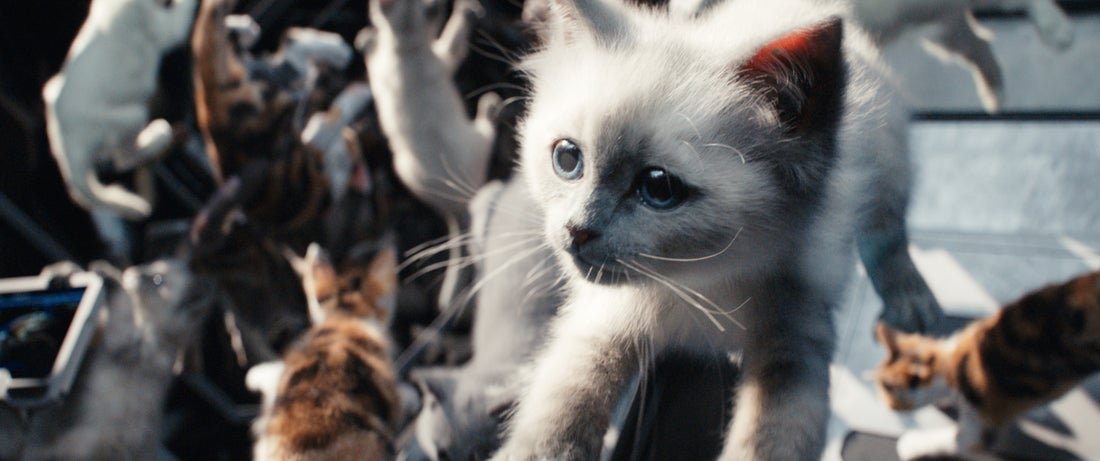Marvel Studios
By Andrea Thompson
Just when I thought I was out, Disney pulls me back in.
I thought the superhero fatigue was real for me, so much so that I completely opted out of “Blue Beetle.” But Disney does what it does, and since it insists on continuing its now sprawling universe, I couldn’t help but be intrigued by “The Marvels.”
How could it be otherwise? “The Marvels” is a concept that’s still relatively rare for a Marvel Cinematic Universe offering that doesn’t go straight to streaming - it’s about a superheroine who gets backup from not just one, but two others in supporting roles, each with their own rich history and complexities.
Teyonah Parris gets some needed development as Monica Rambeau, who finally gets to sort things out with Captain Marvel, aka Carol Danvers (Brie Larson), currently hanging out in space with Nick Fury (a very much missed from the big screen Samuel L. Jackson).
But one of the most radical turns “The Marvels” takes is to make their story a continuation Kamala Khan’s (Iman Vellani), who has only recently taken up the Ms. Marvel moniker. Her miniseries of the same name is what is required viewing, not to mention the first Marvel product in a while to make me not only tear up, but reminisce at what it’s still possible to accomplish within corporate guidelines.
The Marvels” actually picks up where “Ms. Marvel” left off, with Carol finding herself transported to Kamala’s room, much to her confusion. This development is both central premise and running gag, with Carol, Kamala, and Monica switching places with each other whenever one of them uses their powers, which is justified by the sciencey explanation that it’s all because each of their abilities make use of light.
Marvel Studios
Either way, Iman Vellani is a standout, with her fangirling over Captain Marvel proving to be even more adorable than when Tom Holland’s Spider-Man first met Iron Man. In a time where the Marvel universe and multiverse and prequels and sequels seem to be on the verge of becoming an exhaustive, never-ending sprawl, Vellani might prove to be its savior.
She is already its heart, since the movie is aware that Kamala is a package deal, with her family already proven to be so central that matriarch Muneeba Khan (Zenobia Shroff) is the one who creates her daughter’s on-screen superhero look, and patriarch Yusuf Khan (Mohan Kapur) is the inspiration behind his daughter’s decision to choose an alias that fuses her history and hero worship.
The Khans are the ones who emphasize how the simple act of trashing a house has serious consequences in a movie about traversing space and different realities. When Captain Marvel shows up, one of their first questions is whether she’s pressuring their daughter, and they are a centering influence even when they’re whisked from Earth to Fury’s base of operations.
So who cares that the actual plot of “The Marvels” is actually kind of a mess, with a premise that could be lifted straight from “Spaceballs”? With very few exceptions, it’s the heroes that are icons in this franchise, so Dar-Benn (Zawe Ashton) follows the usual pattern of being rather lackluster in comparison to the good guys, plotting to steal the atmosphere and suns of other worlds in order to revive her homeworld, which has been stripped of much of its wealth and resources. It’s so old school that the only development which veers slightly into originality is the climax involves a big beam of light in space rather than the plain ol’ sky.
Thing is though, “The Marvels” is also old school in another, more unfortunate way, sticking to a thin veneer of heteronormativity to the point that Monica’s admission that she was just a kid who wanted her…aunt brings the kinds of tears that we can all see for what they really are. Because right, Sailor Uranus and Sailor Neptune were cousins, and Xena and Gabrielle were merely best friends. 😉
Marvel Studios
You wouldn’t think such pretense would be necessary in these times, but Captain Marvel is a heroine so queer-coded she brings her cat into space with her. Hell, “The Marvels” might actually be the closest thing the MCU has gotten to a queer party, with Tessa Thompson showing up for a Valkyrie cameo fabulously attired in a suit, and the central trio journeying to another planet where the language is based in song, and sees Carol dancing with a gorgeously androgynous prince.
If it seems like the movie ricochets in all kinds of directions, that’s because it does, and the result is a gorgeous mess that never loses its sense of fun. In that sense, it bears a passing resemblance to “Ant-Man and the Wasp: Quantumania,” which saw communing with ants as the key to saving the universe. But that has nothing on one of the later developments of this movie, where otherworldly kittens prove to be the key to saving lives. Whoever thought of that particular development was either high, a genius, or possibly a combination of the two.
You’ll just have to see it to believe it, and it’s a kick to see a movie that proves Nia DaCosta is still the director of the excellent, woefully underseen “Little Woods” after the dismal experience that was the new “Candyman,” with “The Marvels” also written by women. It shows, and it also explains the exhaustively predictable backlash this one is earning. If you do give it a watch though, you might just get excited about what the MCU has in store for the first time in a very long time.








